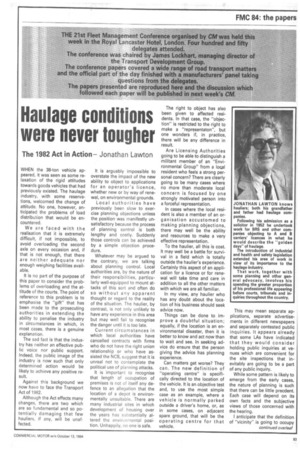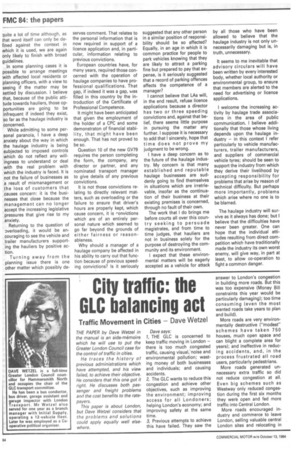Haulage conditions were never tougher
Page 85

Page 86

If you've noticed an error in this article please click here to report it so we can fix it.
The 1982 Act in Action— Jonathan Lawton
WHEN the 38-ton vehicle appeared, it was seen as some relaxation of the rigid attitudes towards goods vehicles that had previously existed. The haulage industry, with some reservations, welcomed the change of attitude. No one, however, anticipated the problems of load distribution that would be encountered.
We are faced with the realisation that it is extremely difficult, if not impossible, to avoid overloading the second axle on every occasion and, if that is not enough, that there are neither adequate nor enough weighing facilities available.
It is no part of the purpose of this paper to consider the problems of overloading and the attitude of the courts. The point of reference to this problem is to emphasise the "gift" that has been made to the prosecuting authorities in extending the ability to penalise the industry in circumstances in which, in most cases, there is a genuine explanation.
The sad fact is that the industry has neither an effective public voice nor public support. Indeed, the public image of the industry is now such that only determined action would be likely to achieve any positive result.
Against this background we now have to face the Transport Act of 1982.
Although the Act effects many changes, there are two which are so fundamental and so potentially damaging that few hauliers, if any, will be unaffected. It is arguably impossible to overstate the impact of the new ability to object to applications for an operator's licence, whether new or by way of renewal, on environmental grounds.
Local authorities have previously been slow to exercise planning objections unless the position was manifestly unsatisfactory because the process of planning control is both lengthy and costly. Suddenly those controls can be achieved by a simple objection procedure.
Whatever may be argued to the contrary, we are talking about planning control. Local authorities are, by the nature of their responsibilities, particularly well-equipped to mount attacks of this sort and often do so without any apparent thought or regard to the reality of the situation. The haulier, by contrast, is not only unlikely to have any experience in this area but may well fail to recognise the danger until it is too late.
Current circumstances in which local authorities have cancelled contracts with firms who do not have the right union relationship or who have assisted the NCB, suggest that it is unreal not to contemplate the political use of planning attacks.
It is important to recognise that length of occupation of premises is not of itself any defence to an allegation that the location of a depot is environmentally unsuitable. There are many industrial sites in which development of housing over the years has substantially altered the environmental position. Unhappily, no one is safe. The right to object has also been given to affected residents. In that case, the "objection" is restricted to the right to make a "representaton", but one wonders if, in practice, there will be any difference in result.
Are Licensing Authorities going to be able to distinguish a militant member of an "Environmental Group" from a loul resident who feels a strong personal concern? There are clearly going to be many cases where no more than moderate local concern is focused by one strongly motivated person into a forceful representation.
In cases where the local resident is also a member of an organisation accustomed to making planning objections, there may well be the ability and resources to make a very effective representation.
To the haulier, all this is cost. It may well be a battle for survival in a field which is totally outside the haulier's experience. Certainly this aspect of an application for a licence or for renewal will take time and care in addition to all the other matters with which we are all familiar.
In my view, any haulier who has any doubt about the location of his business should seek advice now.
Things can be done to improve a doubtful situation; equally, if the location is an environmental disaster, then it is better to know and act now than to wait and see. In seeking advice do ensure that the person giving the advice has planning experience.
Can matters get worse? They can. The new definition of "operating centre" is specifically directed to the location of the vehicle. It is an objective test and, to use the most simple case as an example, where a vehicle is normally parked outside a driver's home, or, as in some cases, on adjacent spare ground, that will be the operating centre for that vehicle. This may mean separate applications, separate advertisements in different newspapers and separately contested public inquiries. It appears already that some LAs have indicated that they would consider holding public inquiries at venues which are convenient for the site inspections that inevitably are going to be a part of any public inquiry.
While some pattern is likely to emerge from the early cases, the nature of planning is such that there can be little precdent. Each case will depend on its own facts and the subjective views of those concerned with the hearing.
I anticipate that the definition of "vicinity" is going to occupy quite a lot of time although, as that word itself can only be defined against the context in which it is used, we are again only likely to finish with broad guidelines.
In some planning cases it is possible to arrange meetings with affected local residents or planning officers, with a view to seeing if the matter may be settled by discussion. I believe that, because of the public attitude towards hauliers, those opportunities are going to be infrequent if indeed they exist, so far as the haulage industry is concerned.
While admitting to some personal paranoia. I have a deep anxiety about the way in which the haulage industry is being subjected to imposed controls which do not reflect any willingness to understand or deal with the real problem with which the industry is faced. It is not the failure of businesses as a result of mismanagement or the loss of customers that causes concern: it is the businesses that close because the management can no longer accept the increasing legislative pressures that give rise to my anxiety.
Returning to the question of overloading, it would be encouraging to see the vehicle and trailer manufacturers supporting the hauliers by positive action.
Turning away from the planning issue there is one other matter which possibly de
serves comment. That relates to the personal information that is now required in support of a licence application and, in particular, information relating to previous convictions.
European countries have, for many years, required those concerned with the operation of haulage companies to have professional qualifications. That gap, if indeed it was a gap, was filled in this country by the introduction of the Certificate of Professional Competence.
It might have been anticipated that given the employment of the holder of a CPC and some demonstraton of financial stability, that might have been enough. That has not proved to be so.
Question 10 of the new GV79 requires the person completing the form, the company, any director or partner, and any nominated transport manager to give details of any previous convictions.
It is not those convictions relating to directly relevant matters, such as overloading or the failure to ensure that driver's hours are properly kept, which cause concern, it is ronvictions which are of an entirely personal nature which seemed to go far beyond the grounds of either fairness or reasonableness.
Why should a manager of a haulage company be affected in his ability to carry out that function because of previous speeding convictions? Is it seriously suggested that any other person in a similar position of responsibility should be so affected? Equally, in an age in which it is common practice for people to park vehicles knowing that they are likely to attract a parking fine but prepared to pay that expense, is it seriously suggested that a record of parking offences affects the competence of a manager?
I cannot believe that LAs will, in the end result, refuse licence applications because a director has two or three speeding convictions and, against that belief, there seems little purpose in pursuing the matter any further. I suppose it is necessary to add that I sincerely, hope that time does not prove my judgment to be wrong.
I have a deep concern as to the future of the haulage industry. My concern is that many established and reputable haulage businesses are suddenly going to find themselves in situations which are irretrievable, insofar as the continuation of their business at their existing premises is concerned, through no fault of their own.
The work that I do brings me before courts all over this country seeking to persuade magistrates, and from time to time judges, that hauliers are not in business solely for the purpose of destroyiing the community and its environment.
I expect that these environmental matters will be eagerly accepted as a vehicle for attack by all those who have been allowed to believe that the haulage industry is not only unnecessarily damaging but is, in truth, unnecessary.
It seems to me inevitable that advisory circulars will have been written by every interested body, whether local authority or environmental group, to ensure that members are alerted to the need for advertising or licence applications.
I welcome the increasing activity by haulage trade associations in the area of public communication. I believe additionally that those whose living depends upon the haulage industry — in this context I refer particularly to vehicle manufacturers, trailer manufacturers, and suppliers of commercial vehicle tyres; should be seen to support the industry from which they derive their livelihood by accepting responsibility for problems that arise by reason of technical difficulty. But perhaps more importantly, problems which arise where no one is to be blamed.
The haulage industry will survive as it always has done; but I believe that the difficulties have never been greater. One can hope that the individual attitudes resulting from direct competition which have traditionally made the industry its own worst enemy, will give way, in part at least, to allow co-operation to fight a common danger.
















































































































































